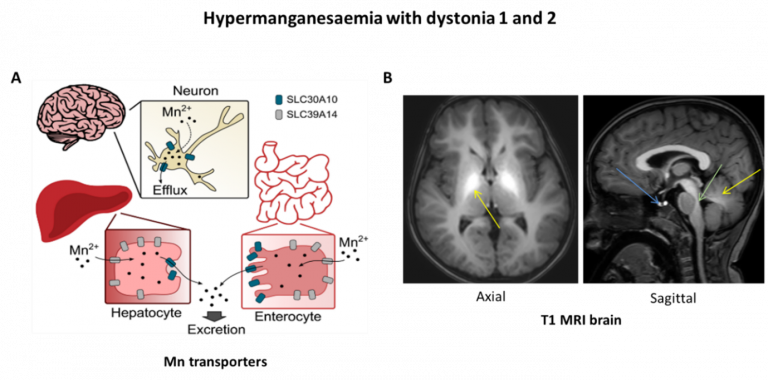Inherited Manganese Transporter Defects
Manganese is an essential trace metal and critical for brain physiology and development. However, excess manganese is neurotoxic and leads to dystonia-parkinsonism, psychiatric and intellectual disability.
Our research has identified two manganese transporter defects associated with manganese neurotoxicity – hypermanganesaemia with dystonia 1 (HMNDYT1) and 2 (HMNDYT2). They are caused by loss-of-function mutations in SLC30A10 and SLC39A14, respectively, that encode manganese transporters that act in conjunction to mediate metal excretion. Manganese deposition in the brain leads to progressive, childhood-onset dystonia-parkinsonism associated with significant disability and premature death.
Our lab is part of Zebrafish research at UCL. We use manganese transporter mutant zebrafish as models for manganese overload/deficiency in order to dissect how metal dyshomeostasis disrupts neurons, synapses and circuit function with the view to identifying new therapeutic targets. In addition, we are working to develop a novel, orally bioavailable Mn chelator to improve treatment for disorders associated with Mn neurotoxicity.

- Collaborators
Prof Stephen Wilson, Department of Cell and Developmental Biology, UCL (zebrafish neuroscience)
Prof Andrey Abramov, Institute of Neurology, UCL (neuronal cultures)
Prof John Spencer, Department of Chemistry, University of Sussex & Prof Catherine Tuleu, School of Pharmacy, UCL (Mn chelator development)
Prof Ahad Rahim, School of Pharmacy, UCL (mouse neuroscience)
Prof Philip Blower, Department of Imaging Chemistry and Biology, KCL (52Mn PET)
- Funders
2021 MRC Clinician Scientist Fellowship
2017 GOSHCC Clinical Research Starter Grant
2017 Starter Grant for Clinical Lecturers, Academy of Medical Sciences
2016 UCL Neuroscience ZNZ Collaboration
2012 Action Medical Research – Research Training Fellowship
- Selected Publications
Tuschl K, Taylor CA, Nicolai MM, Bornhorst J, Gubert P, Varão AM, Aschner M, Smith DR, Mukhopadhyay S. Maintaining Translational Relevance in Animal Models of Manganese Neurotoxicity. J Nutr. 2020;150:1360-1369.
Tuschl K, White RJ, Valdivia LE, Niklaus S, Bianco IH, Sealy IM, Neuhauss SCF, Houart C, Wilson SW, Busch-Nentwich EM. Loss of slc39a14 causes simultaneous manganese deficiency and hypersensitivity in zebrafish. doi.org/10.1101/2020.01.31.921130
Tuschl K, Yapici Z, Eraksoy M. Hypermanganesemia with dystonia 1 – a novel mutation and response to iron supplementation. Mov Disord Clin Pract. 2019. 7:94-96.
Anagianni S, Tuschl K. Genetic Disorders of Manganese Metabolism. Curr Neurol Neurosci Rep. 2019. 19:33.
Baguña Torres J, Yu Z, Bordoloi J, Sunassee K, Smith D, Smith C, Chen O, Purchase R, Tuschl K, Spencer J, Platt F, Blower PJ. Imaging of changes in copper trafficking and redistribution in a mouse model of Niemann-Pick C disease using positron emission tomography. Biometals. 2019. 32:293-306.
Rodan LH, Hauptman M, D'Gama AM, Qualls AE, Cao S, Tuschl K, et al. Novel founder intronic variant in SLC39A14 in two families causing Manganism and potential treatment strategies. Mol Genet Metab. 2018. 124:161-167.
Tuschl K, Gregory A, Meyer E, Clayton PT, Hayflick SJ, Mills PB, Kurian MA. SLC39A14 Deficiency. In: Adam MP, Ardinger HH, Pagon RA, Wallace SE, Bean LJH, Stephens K, Amemiya A, editors. GeneReviews®. Seattle (WA): University of Washington, Seattle; 1993-2018.
Tuschl K, Meyer E, Valdivia LE, Zhao N, Dadswell C, Abdul-Sada A, Hung CY, Simpson MA, Chong WK, Jacques TS, Woltjer RL, Eaton S, Gregory A, Sanford L, Kara E, Houlden H, Cuno SM, Prokisch H, Valletta L, Tiranti V, Younis R, Maher ER, Spencer J, Straatman-Iwanowska A, Gissen P, Selim LA, Pintos-Morell G, Coroleu-Lletget W, Mohammad SS, Yoganathan S, Dale RC, Thomas M, Rihel J, Bodamer OA, Enns CA, Hayflick SJ, Clayton PT, Mills PB, Kurian MA, Wilson SW. Mutations in SLC39A14 disrupt manganese homeostasis and cause childhood-onset parkinsonism-dystonia. Nat Comms. 2016. 7:11601
Tuschl K, Mills PB, Clayton PT. Manganese and the brain. Int Rev Neurobiol. 2013. 110:277-312
Tuschl K, Clayton PT, Gospe SM, Mills PB. Dystonia/Parkinsonism, Hypermanganesemia, Polycythemia, and Chronic Liver Disease. In: Pagon RA, Bird TD, Dolan CR, Stephens K, Adam MP, editors. GeneReviews™. Seattle (WA): University of Washington, Seattle; 2012 (updated 2014)
Tuschl K, Stamelou M, Chong WK, Burroughs AK et al. Dystonia with brain manganese accumulation resulting from SLC30A10 mutations: a new treatable disorder. Mov Disord. 2012. 27:1317-1322
Tuschl K, Clayton PT, Gospe SM, Shamshad G, et al. Syndrome of hepatic cirrhosis, dystonia, polycythaemia and hypermanganesaemia – caused by mutations in SLC30A10, a manganese transporter in man. Am J Hum Genet. 2012. 90:457-46
 Close
Close






